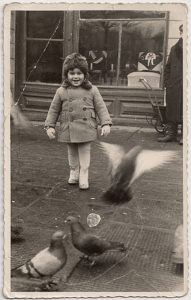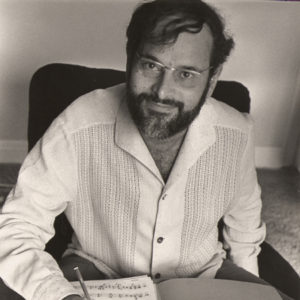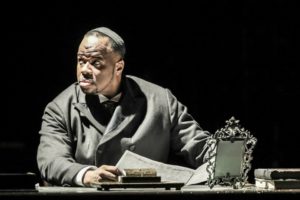The life of André Tchaikowsky was like something out of Shakespeare. His story is a loose tangle of tragic threads with comedy reeking of the grotesque. A narrative in which bitter realism collided with fantastic lies, a narrative populated with a whole host of ambiguous characters – chief among them the protagonist himself, narcissistic and vacillating between extremes.
Tchaikowsky hid his exceptional mind and great musical talent beneath the motley hat of an obnoxious buffoon. Himself wounded and betrayed many times, he bit like a mad dog and shamelessly manipulated the people he loved. Oversensitive concerning himself, he reacted aggressively to criticism. The only person he permitted to make fun of him was he himself. So he made fun mercilessly. In love with the bard of Stratford-on-Avon, he decided to become a Shakespearean actor after his own death, in the form of the royal jester’s skull. He brought the presentation of his opera based on The Merchant of Venice to pass from beyond the grave, by awakening the conscience of a man who could not rid himself of the feeling that he had driven the composer to that grave. A Jew. A homosexual. An introverted genius. Sometimes a real asshole. A multiplied and magnified figure of social exclusion.
He was born on 1 November 1935 – the Christian All Saints’ Day – in Warsaw, into an assimilated Jewish family. He started his life as Robert Andrzej Krauthammer, the son of two people who had already grown to hate each other and were then attempting to get a divorce. After his father left for France, the boy remained in Warsaw under the care of his mother, Felicja, and his grandmother, Celina. He was an unruly, stubborn and impossibly talkative child – as often happens with little geniuses. At age three, he could read fluently in three languages and two alphabets. When it emerged that he was assimilating musical notation and recognizing the structure of the notes on the keyboard with equal ease, his grandmother decided that he would become a great pianist. This was by no means the last of her decisions concerning his fortunes.
Robert Andrzej at age three. Photo: Tchaikovsky Estate.
Two weeks after André’s fourth birthday, when the Germans had isolated the ghetto from the rest of the city, Celina announced that she was a Christian and demonstratively moved out from the home of her daughter and grandson. We have every reason to believe that this apparently selfish decision was actually a heroic gesture of care for the family. For two years, the grandmother supplied the two of them with food and other provisions. In his childish opinion, André was living a quite normal life: he studied, played out in the courtyard, once or twice saw a corpse on the street, but didn’t grasp the meaning of this scene. If he suffered, it was only because sometimes he wasn’t allowed to play the piano. He had a way around that: he would strike the closed cover of the keyboard with his fingers.
Hell began for the boy in the summer of 1942, in the first months of the shutdown of the ghetto. Celina had false papers done up for the family and decided to bring them out beyond the walls. Felicja would not hear of it: she had fallen madly in love and gotten remarried to Albert Rozenbaum, a wealthy dentist and Jewish Ghetto Police functionary. The grandmother took matters into her own hands. In July, she dressed André up as a girl, dyed his hair blond and smuggled him out onto the Aryan side. Felicja and Albert stayed. In August, they both went in one of the transports to Treblinka.
André lost his mother, not even knowing about her death – he felt betrayed and conquered by another man. He lost his identity. From that time onward, his name was Andrzej Robert Jan Czajkowski (later becoming known abroad as André Tchaikowsky). In order to make him more believable as a Christian, his grandmother taught him not only the catechism, but also the basics of the peculiar pre-war anti-Semitism. He lost his home, in which it is true that he couldn’t practice the piano, but on the other hand he didn’t have to hide in a closet and take blows from a frustrated woman who was expecting an out-of-wedlock child. He lost faith in people when he was subjected to an operation to reverse his circumcision – in a private apartment, without anesthesia, without the right to scream. He lost everything, but managed to survive.
André Tchaikowsky in 1975. Photo: Sophie Baker.
At the beginning of his new life, he came to hate his grandmother – in his view, the soulless perpetrator of the sufferings dealt to him. The lost bonds and emotions were replaced with a pathological need for acceptance and love. Those who were unwilling or unable to meet that need were repaid as cruelly as he knew how.
Survivor’s syndrome dogged him to his grave. It had its effect on his relationship with his father, with whom Celina put him in contact a few years after the war, among other things in the hope that Krauthammer would finance his son’s studies at the Paris Conservatory. The matter ended in a fight, complete with name-calling and rearranged faces. The syndrome had its effect on the pianistic career of André – the winner of 8th place at the 5th Chopin Competition in Warsaw and 3rd prize at the Queen Elisabeth Competition in Brussels – an artist who continued to struggle with paralyzing stage fright, neglected his practicing, treated influential protectors with disdain, offended conductors and orchestra musicians. The syndrome had its effect on his personal relationships, among others Anita Halina Janowska, a friend from the piano studio at the Warsaw State Music College, with whom he corresponded for over a quarter century after leaving Poland in 1956.
For this sensitive woman, who felt genuine affection for him, he basically turned out to be a ‘guardian devil’ (the title borne by a selection of their letters published for the first time six years after Tchaikowsky’s death, still under the pseudonym Halina Sander). A love impossible to fulfill on account of André’s sexual orientation – of which he made no secret – bore fruit in a bulky volume that deserves to be described in equal measure as a masterpiece of epistolography, and as a blood-chilling testimony to emotional blackmail. Tchaikowsky wrote from Paris, ‘Halinka! I WANT TO HAVE YOU HERE! […] I so much want to have someone who will be mine always – always.’ Janowska wrote back. As if these two children of the Holocaust had to hurt each other in order to be sure of their existence.
Tchaikowsky was always an Anglophile. His decision to move to the United Kingdom – after several years of couch-surfing in the homes of friends in Brussels in Paris – was reportedly made after reading the Grossmith brothers’ novel The Diary of a Nobody, an 1892 satire of the English petty bourgeoisie. He was drawn to a world that was able to make fun of a ‘a nice six-roomed residence, not counting basement’. He longed for a bit of stability in a country of uninterrupted cultural tradition.
He rented a house in Cumnor near Oxford, where he could finally give himself over to his passions – composing, reading and long walks – without exposing himself to constant pressure from his surroundings. He grew fat, ugly and bald, wrote two piano concerti, two quartets and a handful of vocal works. In 1966, he composed music for an Oxford production of Hamlet. Two years later, he began work on The Merchant of Venice – his only and, in the end, unfinished opera, which was borne of a fascination with Shakespeare’s praise of music in the fifth and last act of the play. He worked on the bard of Stratford-on-Avon’s masterpiece together with newly-met stage director and dramaturg John O’Brien. They soon decided that they would take on the entire text. The idea came from O’Brien, who from the beginning could not hide his amazement that Tchaikowsky gave in to his suggestion. The Merchant of Venice had for decades kept Shakespeare specialists awake until all hours of the night as they argued over the supposed anti-Semitism of Shakespeare’s text.
Lester Lynch as Shylock in the WNO’s production of The Merchant of Venice. Photo: Johan Persson.
And there was something to argue about. Anti-Semitism? But the Jews had been driven out of English in 1290, during the reign of Edward I! Shakespeare had no idea of the Jews; he was engaging with a myth, perhaps he envied the success of Marlowe and his revenge tragedy The Jew of Malta. Really? What about the scandal featuring Roderigo Lopez, court doctor to Elizabeth I and child of Jewish converts, who was condemned to death in 1594 for an attempt to poison the queen? There is much reason to believe that it was he who was the prototype for the character of Shylock. Let us add that The Merchant of Venice was a favourite play of the Nazis which, between 1933 and the outbreak of the war, had seen over 50 new productions in Germany.
There is no way to resolve this dispute. Everyone’s eyes, even those of anti-Semites, start to tear up when Shylock cries out in Act III: ‘Hath not a Jew hands, organs, dimensions, senses, affections, passions?’ No one can figure out why André Tchaikowsky – an escapee from the Warsaw ghetto – composed a concise, dramaturgically coherent opera based on this particular play by Shakespeare. Yet another jester’s gesture? Yet another provocation? Or perhaps a conclusion ahead of his time that over 400 years ago, the bard of Stratford-on-Avon had spoken in the name of all excluded persons? In this opera, Tchaikowsky is not only Shylock – he is also Antonio submerged in depression, Bassanio longing for happiness, Portia pretending to be someone completely different.
In 1978, most of the material was ready. In April 1981, Tchaikowsky wrote a letter to George Lascelles, Lord Harewood, at the time director of the English National Opera, assuring him that in October, he would present to him the final version of the first two acts. In December, he couldn’t find enough words to praise music director Mark Elder, ‘a blond of angelic beauty’, as well as a ‘nearly equally beautiful youth’ in the person of artistic director David Pountney. In March 1982, he noted in his diary that ENO had rejected his proposal to produce The Merchant.
He died of cancer on 25 June, at age 46. He left behind the posthumous wish that his opera someday be produced, as well as his own skull – left in his will to the Royal Shakespeare Company – which first dried out for two years on the theater’s roof, then took part in a photo session, appeared in a production of Hamlet featuring David Tennant in 2008, after which it was consigned once again to the granary of history.
Nothing more was heard of Tchaikowsky’s The Merchant of Venice. Pountney’s conscience awakened only in 2011, after a conversation with Russian musicologist Anastasia Belina Johnson, who drew attention to the English stage director’s interest in the œuvre of Mieczysław Wajnberg, and reminded him of Tchaikowsky’s opera. Two years later, the work saw its world première, prepared in collaboration with the Adam Mickiewicz Institute: at the Bregenz festival, with stage director Keith Warner, in an international cast under the baton of Erik Nielsen, with the phenomenal Adrián Erőd in the role of Shylock. In 2014, the show came to the stage of the National Opera in Warsaw. I wrote about it over two years ago on the pages of the Tygodnik Powszechny (read here: powszech.net/shylock).
I am returning to The Merchant after my vacation experiences at the Royal Opera House, where the work ended up with the ensembles of the Welsh National Opera, in the same, otherwise good staging, and drew applause not much less than that which accompanied the English première of Szymanowski’s King Roger. Tchaikowsky’s music – suspended halfway between Berg, Shostakovich, Britten and the composer’s personal idiom – slowly reveals its deficiencies. It also confirms its strong points: erudite compositional work (at moments, ironically, from under the banner of ‘the first Tchaikovsky’), dramaturgical coherence and believability of the characters. I shall withhold any objective assessment of The Merchant as a music theater work until it begins its parade through Polish and foreign opera stages, in the renditions of other directors as well.
It is a good thing, however, that I went to London for this show. For more and more frequently, I find Szymborska’s words knocking about in my head:
It’s time to take my head in hand
and say: Poor Yorick, where’s your ignorance,
where’s your blind faith, where’s your innocence,
your wait-and-see, your spirit poised
between the unproved and the proven truth?
Tchaikowsky gave his rotten skull over to theater and opera people perhaps precisely because he did not believe in his own innocence and wait-and-see. It is bitter and characteristic that doubts are still the domain of the excluded.
Translated by: Karol Thornton-Remiszewski



